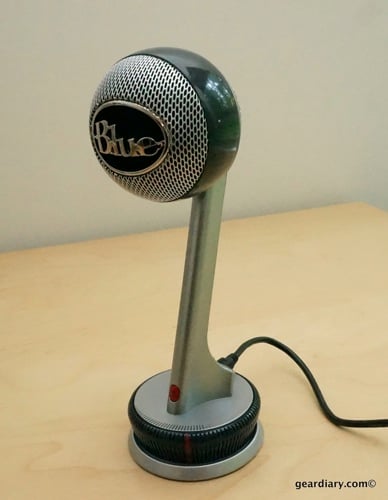
A few months ago, we reviewed the Spark Digital from Blue Microphone. It impressed me with its design, features and quality. (I also really liked the way it looks.) The Spark Digital has an MSRP of just under $200. That’s not a bad price, but it also puts it a bit out of reach of most consumers looking for a budget speaker. That’s why the Nessie from Blue Microphone intrigued me. Judie and I first saw it at CES 2013, and we were impressed with the design, the quality, the onboard technology and, perhaps most of all, the price. The Nessie is under $100.
Blue Digital sent one along for review. While this may be an inexpensive adaptive USB microphone, I’m glad to report there is nothing cheap about it. No, the Nessie is a great way to record better audio in as simple and inexpensive a manner as possible.
Let’s take a closer look.
With the Nessie, Blue Microphone aims to “take the fear out of great recording by instantly delivering studio-enhanced sound for desktop recording of vocals, instruments, voiceovers and more”. Onboard professional studio processing allows the Nessie to adapt to whatever audio is being recorded, while a built-in pop filter and an internal shock mount all work together to help make insure recordings come out crisp, clear and unmarred by unwanted and unintended additional noises. As Blue Microphones explains,
The built-in, studio-grade pop filter and shockmount reduce harsh plosives and disruptive rumbling and vibrations, while the adaptive processing, including EQ, de-esser and level control, automatically smoothes and refines your audio in real time.
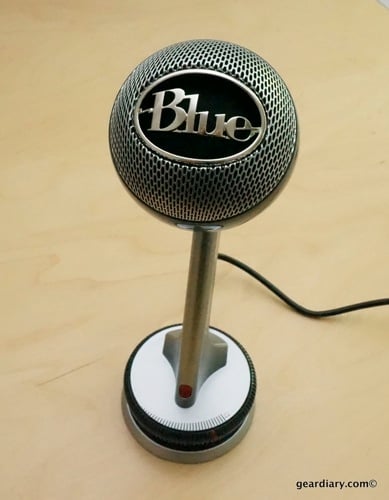
When sitting on a desk, the Nessie makes quite a statement. It not only has an unusual, serpentine look — hence the name — but it also is a large enough presence that won’t slink into the background. In its “Home Position”, that is the head not extended up or out, the Nessie is 3.75”x 3.75” x 10”. It weighs in at 1.4 lbs. It works with both Macs and PCs, and it requires no additional software. Simply plug the microphone in, select it as the audio input source for the computer, and you are ready to use it.
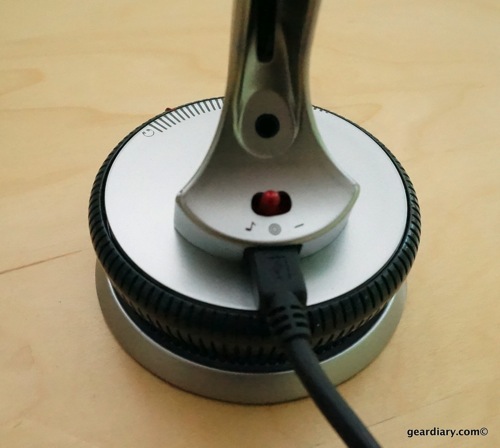
The Nessie offers three different recording modes, each optimized for a different type of audio input, and each selected by simply moving the three-position toggle at the back of the Nessie from one position to another.
One mode is optimized to deliver rich vocals. The second is designed to capture the detailed sounds of instruments. The third position is intended to record raw audio that will be later-manipulated during post-production editing.
The Nessie also features a zero-latency headphone output along the back, into which a favorite pair of headphones can be plugged.
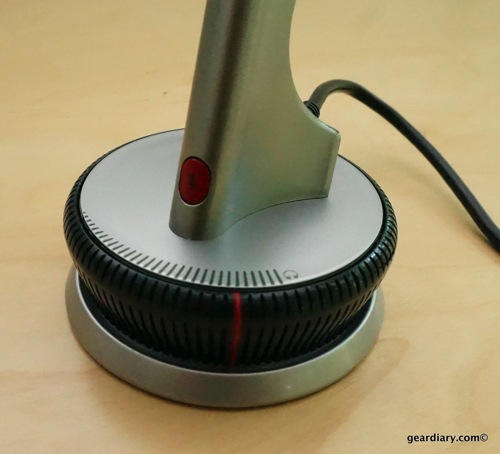
And while the 3.5mm port is along the back of the Nessie, the mute button and headphone volume adjustment are on the front and the base of the Nessie.
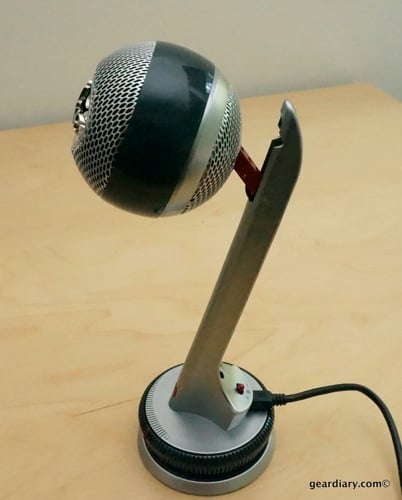
The Nessie’s head offers “serpentine flexibility” and adjusts to capture audio coming below, in front or above it. The hinges are surprisingly sturdy! And to make matters even simpler, the Nessie is plug-and-play compatible with both Macs and PCs.
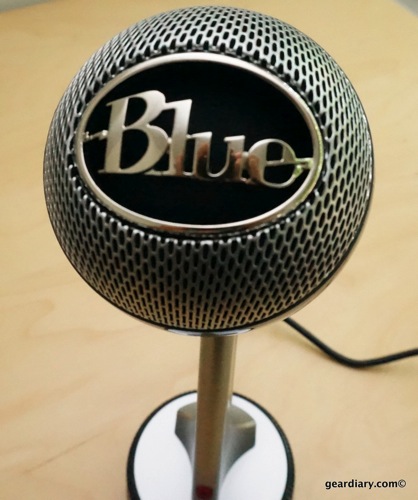
For those interested, the audio specificiations of the Nessie look like this:
Power Required/Consumption: 5V 150mA
Sample Rate: 48 kHz
Bit Rate: 16bit
Capsules: 1 Blue-proprietary 14mm condenser capsule
Polar Patterns: Cardioid
Frequency Response: 20Hz – 20kHz ?Max SPL: 110dB (THD: 0.5% 1kHz)
?
Impedance:16 ohmsPower Output (RMS): 100 mW
THD: 0.009%
Frequency Response: 15 Hz – 22 kHz
Signal to Noise: 100dB
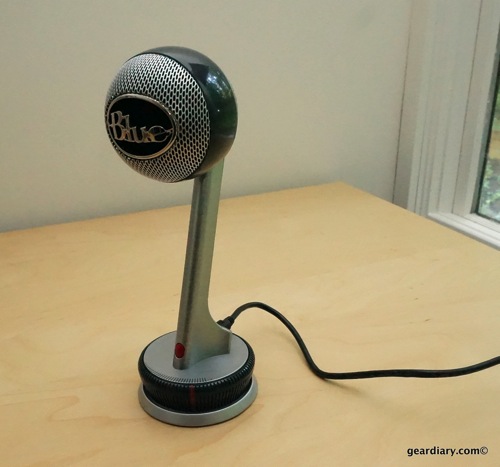
I’m impressed by this microphone and love that it is priced below $100. That makes it accessible to pretty much anyone with a Mac or a PC. And while it does a great job of capturing audio that requires no post-production manipulation — just check out how clear the audio on the video is once I began using the Nessie — the fact that it works amazingly well for voice recognition is a huge bonus for me.
Having te Nessie on my desk and always plugged in means I can start using voice recognition in seconds, and I don’t need to wear a dorky headset. The Nessie certainly doesn’t look and feel as substantial as the Spark Digital, and I do wish the Nessie — like the Spark Digital — had the ability to work with both computers and iOS devices, but the Nessie is under $100 while the Spark Digital is twice that.
Most importantly, the Nessie is simple to use: it does an excellent job of recording audio, and it lets you finish recording and — in most cases — be done without additional post-production work. That’s quite a good combination.
If you want the flexibility of using a microphone with computers and iOS devices, want something that looks and feels striking and impressive, and you don’t mind doing post-production editing, then you may want to look to the Spark Digital. If, on the other hand, you want a good quality microphone with a built-in pop filter, and you don’t want to do any post-production work, then I think you will find the Nessie fits the bill quite well.
You can learn more and order yours.
MSRP: $99.95
What I Like: Well-made and under $100; Does a good deal of audio processing onboard so there is no post-production work required; Built-in pop filter; Plug and play with Macs and PCs
What Needs Improvement: Doesn’t work with iOS devices the way the Spark Digital can
Source: Manufacturer supplied review sample

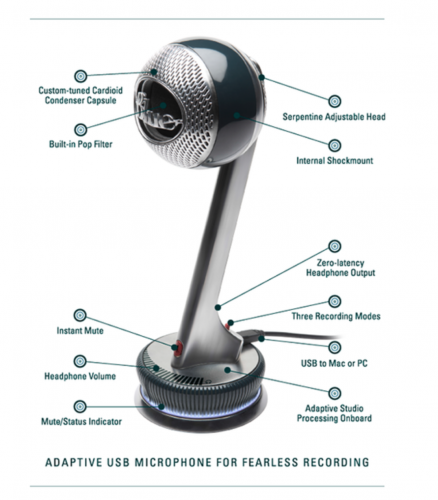
This is the best Nessie review I have found. Thanks for doing this!
Thanks John! I’m using it all the time and really love the simplicity.
I am getting ready now to go out and buy one! Thanks again.
Hi! This looks like a great microphone. I was wondering how well you thought it worked compared to other microphones that you might have used for voice recognition?
I have the best luck with headphones that you wear and have a boom that puts the microphone right at your mouth but I love the convenience of something like this and it works as well as anything I have tried of this style.